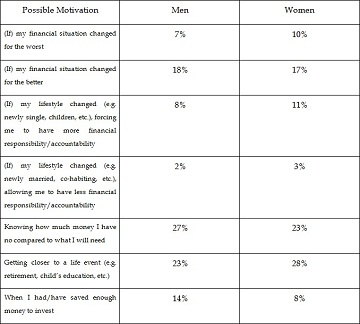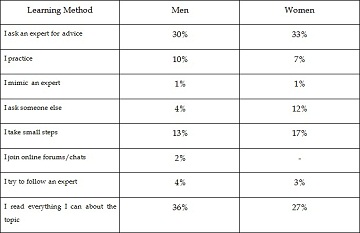Men and Women Differ When It Comes to Investment Motivations: Women Most Influenced by Life Events (28%), Men Swayed by Progress Towards Future Needs (27%)
Men and women also diverge when it comes to reflecting on their own confidence in their investing. Six in ten (61%) men `agree' (9% strongly/52% somewhat) that `I am a good investor, I have no concerns', while four in ten (39%) `disagree' (7% strongly/32% somewhat) with this statement. Less than half (47%) of women, on the other hand, `agree' (7%/40%) that they have no concerns that they are good investors, while more than half (53%) `disagree' (16% strongly/37% somewhat) that they are good investors.
Instead, women are more likely to feel nervous and less confident about making investment decisions. The majority (53%) of women `agree' (14% strongly/39% somewhat) that `I am nervous that I will make the wrong investment decision', compared to a minority (47%) that `disagree' (13% strongly/34% somewhat). While a majority of women are nervous about their investment decision-making, only four in ten men (43%) similarly `agree' (7% strongly/36% somewhat), while six in ten (57%) men `disagree' (15% strongly/42% somewhat) with this sentiment.
There is less of a gap in confidence relating to investment decision-making between men and women, but a gap still exists. Four in ten (43%) women `agree' (11% strongly/32% somewhat) that `I am not confident enough to make decisions on my own', while six in ten (57%) women `disagree' (20% strongly/37% somewhat). Four in ten (36%) men also `agree' (6% strongly/30% somewhat) that they aren't confident in their decision-making ability, although two-thirds (64%) of men `disagree' (21% strongly/43% somewhat).
The gap between men and women further decreases when describing levels of knowledge about their finances. Four in ten (42%) women `agree' (9% strongly/32% somewhat) that `I don't feel knowledgeable enough about my finances', while six in ten (58%) women `disagree' (18% strongly/41% somewhat). Four in ten (37%) men also `agree' (6% strongly/31% somewhat) that they don't feel knowledgeable enough about their finances, creating only a five point gap between men and women, while six in ten (63%) `disagree' (18% strongly/46% somewhat) that they lack enough knowledge about their finances.
Where the gap closes, however, is based around a matter of interest in investments and learning more them. Three in ten women (27%/5% strongly/23% somewhat) and men (28%/5% strongly/23% somewhat) `agree' that they `are not interested in their investments enough to learn more'. This leaves three-quarters of men (72%/33% strongly/39% somewhat) and women (73%/32% strongly/40% somewhat) who `disagree' that they aren't interested enough to learn more.
When learning new information, like how to manage savings and investments for example, men and women have their own methods. Four in ten (36%) men say they `read everything I can about the topic', compared to only three in ten (27%) women who say the same. Men (30%) and women (33%) are almost equally as likely to `ask an expert for advice' when learning something new. The following chart outlines different types of methods that help men and women learn best:
Despite their differences, men and women are on equal ground when it comes what they believe are the benefits to being knowledgeable and/or involved in managing their savings and investments. Two-thirds of men (64%) and women (65%) say that a main benefit of being knowledgeable and involved is that `it allows/would allow them to plan for their future'. Slightly more women (52%) than men (48%) say benefits of knowledge and involvement in managing their savings and investments `gives/would give them peace of mind'. Half of men (47%) and women (49%) believe that another benefit of knowledge and involvement would be that `it allows/would allow them to have more control over how their investments are managed'. The following table outlines the full list of stated benefits of being knowledgeable and involved in managing savings/investments:
These are some of the findings of an Ipsos Reid poll conducted between June 6th and June 11th, 2012, on behalf of RBC Direct Investing. For this survey a sample of 1,020 Canadians from Ipsos' Canadian online panel was interviewed online. Weighting was then employed to balance demographics to ensure that the sample's composition reflects that of the adult population according to Census data and to provide results intended to approximate the sample universe. A survey with an unweighted probability sample of this size and a 100% response rate would have an estimated margin of error of +/- 3.1 percentage points, 19 times out of 20, of what the results would have been had the entire population of adults in Canada been polled. All sample surveys and polls may be subject to other sources of error, including, but not limited to coverage error, and measurement error.
For more information on this news release, please contact:
Sean Simpson
Associate Vice President
Ipsos Reid Public Affairs
416.572.4474
[email protected]
About Ipsos Reid
Ipsos Reid is Canada's market intelligence leader, the country's leading provider of public opinion research, and research partner for loyalty and forecasting and modelling insights. With operations in eight cities, Ipsos Reid employs more than 600 research professionals and support staff in Canada. The company has the biggest network of telephone call centres in the country, as well as the largest pre-recruited household and online panels. Ipsos Reid's marketing research and public affairs practices offer the premier suite of research vehicles in Canada, all of which provide clients with actionable and relevant information. Staffed with seasoned research consultants with extensive industry-specific backgrounds, Ipsos Reid offers syndicated information or custom solutions across key sectors of the Canadian economy, including consumer packaged goods, financial services, automotive, retail, and technology & telecommunications. Ipsos Reid is an Ipsos company, a leading global survey-based market research group.
To learn more, please visit www.ipsos.ca.
About Ipsos
Ipsos is an independent market research company controlled and managed by research professionals. Founded in France in 1975, Ipsos has grown into a worldwide research group with a strong presence in all key markets. In October 2011 Ipsos completed the acquisition of Synovate. The combination forms the world's third largest market research company.
With offices in 84 countries, Ipsos delivers insightful expertise across six research specializations: advertising, customer loyalty, marketing, media, public affairs research, and survey management.
Ipsos researchers assess market potential and interpret market trends. They develop and build brands. They help clients build long-term relationships with their customers. They test advertising and study audience responses to various media and they measure public opinion around the globe.
Ipsos has been listed on the Paris Stock Exchange since 1999 and generated global revenues of e1,363 billion (1.897 billion USD) in 2011.
Visit www.ipsos-na.com to learn more about Ipsos' offerings and capabilities.






